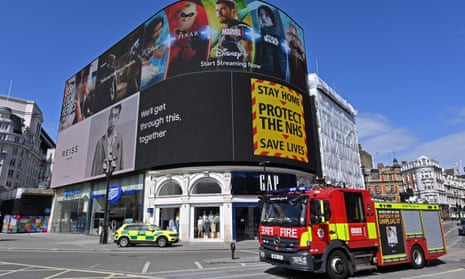Lucy Jameson is facing a conundrum as she advises cautious customers of her advertising agency: when are companies allowed to make jokes about the pandemic-induced lockdown?
“I think it’s pretty soon,” said Jameson, a co-founder of Uncommon, reflecting on how advertisers are having to juggle the severity of the situation with the emotions of an audience who face being stuck at home for months. “You’ve got to do it cleverly. There are still lots of people dying, but people are desperate for a bit of light relief. It’s about striking the balance right.”
Advertisers are struggling to work out how to promote their products during an age of physical distancing, walking the tightrope between continuing to sell goods where possible, building their brands, and trying not to look insensitive.
Already there are a few basic rules of thumb that are changing how advertising looks. Footage of people socialising outside the home is out, as it may look jarring to audiences in lockdown; adverts that resemble Zoom calls are in, but may already be a cliche; and everyone’s trying to work out how to create new promotions without being allowed outside.
“The number one thing advertisers are worried about is getting the right tone,” said Kelly Williams, ITV’s commercial boss. “People will remember how you behave during the crisis. We’re finding advertisers who can’t trade still looking to spend some money to keep their voice.”
The advertising market has collapsed, in step with much of the rest of the economy, threatening the funding for vast swathes of the media. Many major advertisers such as high-street retailers and holiday companies have cancelled their campaigns altogether as they have nothing to sell. This means that even though TV audiences have soared, revenue for commercial broadcasters has collapsed by up to 50%, and some other forms of advertising are performing even worse.
“Television advertising over the next couple of months will be as cheap as it ever has been,” said Williams, who said he had seen signs that some companies were starting to spend again. Until then, he said, audiences should to expect to see the same adverts more often, especially promotions for telecoms, charities, groceries and online shopping.
Necessity has forced innovation, with ITV producing more material in-house and companies turning promotions on their heads. “Some advertisers are having to edit what they’ve got. McCain have got this lovely family campaign narrated by Ricky Tomlinson. They kept the same ad but got Ricky Tomlinson to change the voiceover.”
The Co-op cancelled its Easter TV advertising campaign, which was originally promoting chocolate eggs, and donated millions of pounds of airtime to run an advert featuring supermarket staff urging people to support the food charity FareShare.
Cathedral City created an advert about the joys of sitting at home with a cheese toastie by splicing together footage from old adverts and putting a new soundtrack over the top. Tesco promoted its Easter food sales by showing a video of a family holding a video conference to discuss how best to cook lamb.
Jameson said many big-budget campaigns had been scrapped and her team were desperately trying to think of formats that could be produced in lockdown, with drone footage of empty streets suddenly popular. She predicted that television screens and online video services would soon be filled with adverts produced using animation, which can be produced remotely.
“Advertisers who just running pre-corona stuff looks really weird,” she said. “You see ads for beer, which of course people are still going to want to drink, but somehow it just feels odd to see people in a pub at the moment.”
Many companies have taken it upon themselves to promote stay-at-home messages, although there is a risk that people are baffled when companies that normally sell them beer or clothes start telling them how to stay safe in a pandemic.
With ad spending collapsing, the government has stepped into the void with its big-budget national public health campaign, which has become ubiquitous – especially on news websites.
“You need a short, informative message to get the public’s attention, certainly to resonate with younger audiences today,” said Jeremy Hine, the chief executive of MullenLowe Group UK, which has created the campaign. “‘Stay home, protect the NHS, save lives’ is like a wartime version.”
Following the prime minister’s calls to evoke a blitz spirit, the campaign has been designed to evoke the spirit of the second world war, when the public were told that “coughs and sneezes cause diseases” and the never released “Keep calm and carry on” poster was created.
However, Hine said brands should leave the evocation of war to the government and instead focus on reassuring the public with their advertising messages.
“Being Churchillian is fine for politicians – a rallying cry to lead and set policy, it makes for a powerful, engaging ad campaign,” he said. “But that approach is less meaningful for a brand. Advertisers that are doing it well out there are those like McCain’s ‘staying at home’ work, or PG Tips with the idea of sharing a cup of tea over Skype. They are putting an arm around you.”
